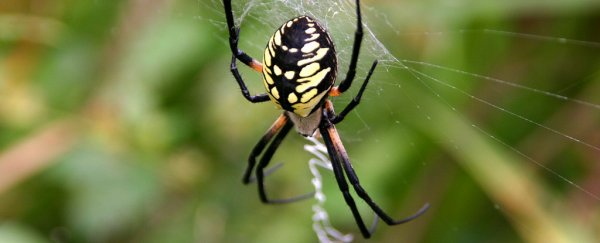Spider webs are already strong enough to restrain small insects unlucky enough to fly into them, and soon, they may be capable of carrying the weight of a person.
In a new study published in 2D Materials, Nicola Pugno at the University of Trento in Italy and his team detail how they cranked arachnids' already impressive metabolic process up to 11 by adding graphene and carbon nanotubes to a spider's drinking water.
Afterward, the spider produced silk as it normally would, but the silk was five times stronger, putting it on par with the likes of pure carbon fibres and Kevlar - the strongest materials on Earth.
"We already know that there are biominerals present in the protein matrices and hard tissues of insects, which gives them high strength and hardness in their jaws, mandibles, and teeth, for example," Pugno told The Sydney Morning Herald.
"So our study looked at whether spider silk's properties could be 'enhanced' by artificially incorporating various different nanomaterials into the silk's biological protein structures."
The enhanced webbing is still in the early phases of research, and Pugno's results were derived from just a small amount of spider silk, so far more testing is required.
If all goes as hoped, the research could eventually lead to millions of enhanced spiders producing webbing that can be used to make parachutes, rope, cables, and more.
And those are just a few of the potential applications of this research. Pugno believes it could eventually be applied to creatures beyond spiders.
"This process of the natural integration of reinforcements in biological structural materials could also be applied to other animals and plants, leading to a new class of 'bionicomposites' for innovative applications," he asserted.
Regardless of where Pugno's work takes us, it provides yet another example of graphene's versatility. In the last month alone, the material has been used to make health-tracking tattoos, construct unbreakable rubber bands, and cause electrons to flow like water.
The super material is now giving living creatures arguably super abilities, and who knows what could be next?
This article was originally published by Futurism. Read the original article.
